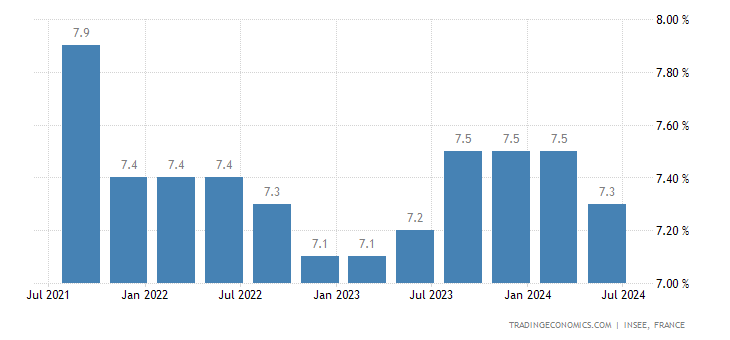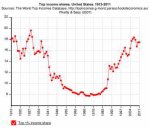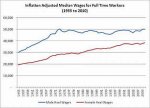Hello, mtguy8787. Thank you for giving me so much information, it is appreciated.
The gist of your posts seems to be that inequality has been decreasing and the wage gap isn't widening on the whole. I call shenanigans;
I was referring to the gap between the increase in productivity, and the increase in wages, not the Gini coefficient.
When using the Gini coefficient, there are a number of things you have to consider.
- Consumption inequality is arguably more important than wage inequality.
- Measures of inequality do not take upward mobility into account. If upward mobility exists, inequality is not a problem.
Massive inequality can exist, because of a massive inequality in the productivity of unskilled workers, and upper echelon workers. However, if equal opportunity exists for the unskilled worker to improve their lot -- how is this a problem -- aside from people's sense of outrage?
You say the top earners haven't been growing their share since 1995. Um, yeah. Yes they have;
Its interesting how your graph references data from 2007, yet goes all the way to 2011.
I this article, I explain why looking at such data isn't as clear cut as it seems to be. The Piketty-Saez data includes numerous variables, including pre-tax vs after tax, and income counted either by including or excluding capital gains.
My article uses CBO data, and it is different from the Piketty-Saez data. This data shows that the pre-tax share in 1986 was 13.2%, and actually lower, at 12.1% in 2003.
The fact is that the income share of the top 1% rises and falls largely with the stock market. When you understand this, the claim that the rich are becoming richer and richer, and at the expense of the poor, no less, becomes nonsensical.
A Look At Wealth Inequality In America: The 1% | New Era Freedom
View attachment 67150650
Oh, and median wage income has risen 30% since 67? Absolutely, and stopped rising by 73. Here's the chart.
1.) No source. Here is the official data for median household income
http://www.census.gov/prod/2007pubs/p60-233.pdf
2.) When it comes to wages, 2 things, as I already mentioned
- It depends which price deflator is used. The BLS typically uses CPI, which has a number of problems. When you use other accepted price deflators, the picture is different.
- Tax incentives have shifted compensation in wages, to compensation in terms of benefits. When looking at hourly compensation, you have to take this into account.
- Furthermore, the fact that your graph reveals that wages for female workers continued to rise, while those for males have stagnated, should immediately clue you in to suspect that it is a misrepresentation, or not presenting the big picture.
- When looking at the big picture, you must take into account the shift in household dynamics. Average wages can be misleading, because low-skilled wages could rise slowly (and justifiably so, as the market value of such work does not necessarily increase that much) -- while ignoring the fact that as a whole, the bulk of households are shifting to a wealthier class.
This article explains:
A Look At Wealth Inequality In America: Stagnating or Falling Household Income and Wages | New Era Freedom
It only rises slightly higher if you take into account an increase in hours worked per week, and the trend towards 2 income households. That's as simple as trading more time for more money, not a great success of modern capitalism.
Actually, the data shows a trend towards 1 person households
Historical Census of Housing Tables -Living Alone
You say that automation has been decreasing the price of goods. I agree that it's expected, but I haven't seen these cheaper goods (but this is mostly due to inflation). When you compare CPI to the increases in Median wages, you do get a slight advantage over time. But, this isn't due to capitalism. Every time we've increased technology and automation, we've decreased the price of goods (whether an actual price or just the labor involved). The only way you can link this to capitalism is if you act like there'd be no new technology in any other system. The USSR gave us; Sputnik, The first astronaut, Mir space station, the first nuclear powered boat, countless technologies based on nuclear energies in general, and ear hats. There were atleast 7 nobel prize winners whose work was funded and handled by the USSR. I'm not the biggest fan of the USSR, mostly because of Stalinism, but the idea that they "needed" capitalism to have new technology is easily proven false by history. Most scientists are working for the sake of curiosity and their duty to humanity, not the money.
Sir:
- It takes far more than theoretical scientific advancements to translate into improved functional technology. Scientist who are not in business play a large role. Scientists working for private enterprises also play a large role.
You give examples of technology not developed in a capitalistic setting, and then assume that, therefore, capitalism is not responsible for any increases in technology. This is completely non-sequitur.
Here are just a few examples of technological improvements due to capitalism -- which also happen to rank among the most significant. In fact, all of the examples you listed are NOT those that contributed significantly or at all to increased production.
- Computer hardware
- Computer software
- Farming technology
- Industrial technology
- Automotive technology
- Medical technology
Theoretical advances, where clear entrepreneurial benefit is not apparent is best served by government funding. Converting scientific advances into applications that will best serve consumer demand is best served by the free market.
There is far more that goes into increased production than theoretical and experimental advances by scientists.
Just like you ignore the role that retail stores play, here you ignore, or fail to comprehend, the assembly of capital that is required to ultimately produce the end-products.
What capitalism does, is to reward organizations that best meet consumer demand. Without this, you will have advances, but there is no efficient mechanism for up-regulating those that advance consumer welfare, and downreglate those that do not. In a state-controlled system, this is entirely decided by bureaucrats who do not have consumer's best interests at heart -- and if they did, they could not, even in principle, direct things to best meet demand.
It is true that some people, such as some scientists, do not work for primarily money (although this is largely not true). But you are again ignoring one of the most important tasks -- organization of capital (which includes human capital such as scientists) -- under the common agenda of developing things that meet consumer demand.
When it comes to this organization, you basically have two alternatives -- capitalism, and state-controlled decision making. Propositions such as complete democratic control of such things are completely unrealistic -- it is nowhere near feasible to have democratic decisions for the countless decisions made in an ever growing and diversifying economy. Your idea to use computers solves nothing, because it is people who must program and continually update them -- it is still people doing the decision making.
Its not that nothing can happen in a state-controlled system -- its simply that capitalism is superior -- and this is moreso the case when you have an expanding and diversifying economy, that is increasingly impossible for any state-controlled system to organize. Take, for example, the area of new and developing software for IT purposes. Capitalism rewards whichever developments are the most superior. The main challenge for any state-controlled system to do this is as follows:
1.) Any state controlled system is subject to a wide range of agenda's, subjective bias and judgements, politics, and more. The self-interest motive in capitalism means that consumer demand is the sole determiner. In a state-controlled system, something is deemed more successful by means of political and bureaucratic judgement. In a free market, the bottom line speaks for itself -- it is meaningless for the opinion of a bureaucratic board to change this.
2.) In a free market, every consumer decision conveys information -- by purchasing an item, a consumer is conveying preference not only for the item purchased, but he is conveying relative preference compared to similar items. He is also conveying priorities, through the purchase of one item over an alternative use. This entire aggregate of information is conveyed unconsciously through the market system.
Capitalism, through the profit motive, organizes capital into configurations where it will best meet consumer demand. The profit motive is efficient because it is based on the price system, which conveys the total aggregate of market information. The free market signals to people, for example, whether more computer scientists vs. computer engineers are needed -- and so on, and so on.
Without this, there is no efficient way to determine what to produce, or how much. The soviet union is a perfect example of this.
Even if many scientists are not primarily motivated by money -- the free market still works to sort out research that contributes to meeting consumer demand from those that do not. Its also a misnomer to say that scientists are not motivated by money -- while some may not care much about their living conditions as long as they can do their research, most scientists, like most people, want a higher standard of living.
You stated that scientists are motivated by their "duty to humanity". You've provided no evidence that scientists have a greater sense of duty than anyone else, or that they have a superior sense of greater duty that overrides their personal interests.
A scientist who wants to work on say, solar technology, will be able to make a better living as this technology becomes more marketable. A scientist would be able to make a better living doing pharmaceutical research, because there is a great demand for their product. This serves to direct research to areas that are more marketable, and not to whatever random curiosity that a scientist might have in your utopian fantasy.
On the other hand scientist who wants to study the mating patterns of birds, or string theory, is unlikely to produce anything marketable, and so, would have a hard time finding any firms to hire them, because although some great discoveries are accidents, most productive research is directed towards a productive goal. As I said, there is a place for theoretical research not immediately related to consumer interests, and there is a place for private research.
If we're going by minimum wage or any comparable wages, it's kind of obvious that it hasn't been getting better. Inflation adjusted minimum wages are slightly lower than they were 30 years ago, and have been falling since the early 60's.
Minimum wage is a horrible measure to go by, and does not reflect economic conditions because it is arbitrarily set. It is a poor measure to go by, because it does not represent the average worker.
As I explain in my article, different price deflators show that wages have increased, and that more importantly, real hourly total compensation increased over 50% from 1970 to 2004.
A Look At Wealth Inequality In America: Stagnating or Falling Household Income and Wages | New Era Freedom
Alot of the disagreements between me and most libertarians/free-market-supporters, is that it makes the assumption that all poor people are poor because they "deserve" to be poor
This is false. Free market supports hold that low income workers earn what they do because they provide low market value. Free market economists tend to refrain from making any such judgements
and all rich people are rich because they "deserve" to be rich.
False. Free market supporters support the earnings of the wealthy, because they have earned it through serving the consumer.
This isn't a problem in a free market, so they support it. My issue is that I've met too many people not only working at minimum wage jobs, but fighting each other to get into minimum wage jobs, after graduating from a 4 year university.
If you want to make money, choose a degree that is in demand. If you choose whatever degree interests you, be prepared if your degree is not as in high demand by other people.
Some of the smartest and most dedicated people I've met are poor. If people were actually paid by their deeds, there'd be a lot of poor people go to the top, and a lot of rich people go to the bottom.
What you are doing here is making a subjective judgement about what people are worth, based on your assessment of their character, and what it is worth.
If you were a real libertarian, you would agree that one person is under no obligation to make an exchange with another, by any means other than the value they gain from it.
A dedicated, hard working person -- call him person A -- who offers something that is not valuable to person B, is not going to get a lot in exchange from person B. If you were a true libertarian, you would agree that person B has the right to decide for himself how valuable he considers person A's offerings, as well as the right to be free to offer whatever he will, or will not for it.
By imposing your own judgement of what some poor people are 'really' worth, and what rich people are 'really' worth, you are imposing a value judgement on the decisions of person B in the above example -- hardly libertarian at all. By saying that a rich person is not 'really' worth what he gets paid, you are saying that the value judgements made by the people who pay him are not 'really' accurate.
You asked why we never have a problem with celebrities and entertainers, and I say you haven't been talking to us long enough. I think that this pay gap is just as disruptive as high CEO pay, and shuts good people out of the industry. I used to go to the dollar theater as a kid, sometimes with a 25 cent special. It's now $11 a ticket, with a $6 special. If you really thought that we didn't have a problem with it, you don't know us. The issue is as simple as priorities; I rather fix the economy as a whole before we fix the entertainment industry.
Good for you -- at least youre consistent, unlike most people.
Do a simple google search for proposals to limit CEO pay, vs proposals to limit celebrity or athlete pay. The disparity between these should tell you all you need to know.
What economic justification do you have for claiming that these high earners are unjustified? Movie stars earn alot because people prefer movies with their favorite star actors in them. The demand for high budget films has increased, hence why the prices have increased. The demand for the entertainment industry has soared, which is why prices are higher. The cost of going to a concert is much higher than the cost of going to say, a scientific lecture. What people like you tend to do is impose their own value judgements on the choices of consumers, and then declare the results to be "unjust". In the above example, the lecture is arguably more valuable than a concert that provides only a moment's pleasure. Nevertheless, it is what people demand, and the free market answers.
If you are judging this as unjust, you are declaring that consumer decisions as to what they want are unjust.





